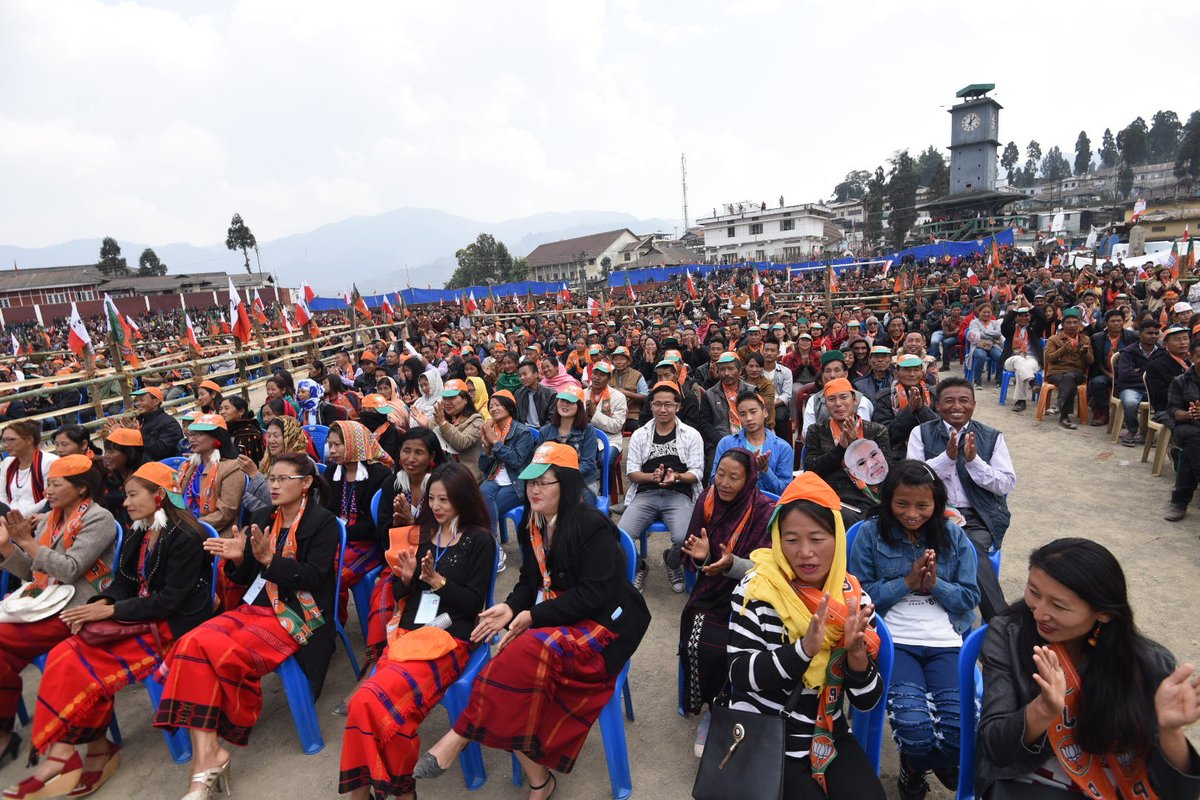Saffron party is facing the test of secularism in Meghalaya,
 SHILLONG : Mandate 2018 in Meghalaya and Congress on Tuesday could be a battle of existence for the Congress and a test for BJP’s ability to sway the largely Christian electorates. But the spotlight is likely to be on a clutch of regional parties that have often resisted waves in favour of national entities.
SHILLONG : Mandate 2018 in Meghalaya and Congress on Tuesday could be a battle of existence for the Congress and a test for BJP’s ability to sway the largely Christian electorates. But the spotlight is likely to be on a clutch of regional parties that have often resisted waves in favour of national entities.
Meghalaya and Nagaland have 60 Assembly seats each, but voting in both States will be for 59. In Meghalaya, election for the Williamnagar seat was countermanded after suspected militants killed Nationalist Congress Party candidate Jonathone N Sangma with an improvised explosive device.
In Nagaland, Nationalist Democratic Progressive Party (NDPP) leader Neiphiu Rio won the Northern Angami-II seat unopposed after his only rival, Chupfuo Angami of the ruling Naga People’s Front (NPF) withdrew from the race.
Mr. Rio, a former chief minister, represented NPF as Nagaland’s lone Lok Sabha member before joining NDPP before the polls. He was instrumental in forging a pre-poll alliance with BJP after the later ditched its 15-year-old ally NPF.
The BJP has fielded 20 candidates while the Congress, which struggled to find candidates, is contesting 18 seats. But they are likely to be fringe players in an election billed as the battle of the satraps — Mr Rio and his friend-turned-foe TR Zeliang, Nagaland’s Chief Minister and the face of NPF now.
Mr Rio had moulded the NPF into a party that, with BJP as an ally, gradually eroded the Congress base in Nagaland. His decision to be a parliamentarian in 2014 and subsequent bid to return to State politics led to a change of guard four times in five years. He patched up with Mr Zeliang, his successor, but fell out again.
It was a matter of time before Mr Rio joined NDPP, which he was believed to have promoted in 2017 in anticipation of being sidelined in the NPF. A few NPF legislators loyal to him defected to the NDPP while some joined ally BJP.
The BJP has gambled with NDPP in view of the anti-incumbency factor weighing against NPF. But it has not written NPF off, claiming their “tried and tested” friendship is still on and indicating it has kept options open. NPF is a member of the BJP-helmed North East Democratic Alliance (NEDA)
The main challenge for the BJP has been its ‘Hindutva’ image with NGOs and church bodies asking voters to be wary of its religious agenda despite the party having offered free trip for senior Christian citizens to Jerusalem, the Holy Land.
The saffron party is also facing the test of secularism in Meghalaya, though other issues – such as ban on coal mining affecting the lives of some 2.5 lakh people across 16 constituencies – have taken over. Unlike Nagaland, the BJP has gone it alone in Meghalaya despite two major regional forces, National People’s Party (NPP) and United Democratic Party (UDP) being members of NEDA.
For the 59 seats going to the polls, the BJP has fielded 46 candidates, but the fight in Meghalaya is likely to be between NPP (52 candidates) and the Congress (59), which led a coalition government for the last nine years.
Much of the action in Meghalaya is expected to be in the Garo Hills where Chief Minister Mukul M Sangma of Congress and NPP chief Conrad K Sangma are vying to be the undisputed leader of the Garo Hills. Politics in these hills was once synonymous with the latter’s father, former Lok Sabha Speaker Purno A Sangma.
A look at the political scenario in Nagaland shows that out of 60 seats in the state assembly, Naga People’s Front or NPF is contesting on 59 seats.Nationalist Democratic Progressive Party (NDPP) has put candidates on 40 seats, BJP is fighting in 20 constituencies and Congress on 19 seats.
In the 60 seat Meghalaya assembly, BJP is contesting on 47 seats, Congress on 59 seats and NPP on 53 seats. The two states will go to polls on 27th February and results would be announced on 3rd March. (With Agency Inputs ).

